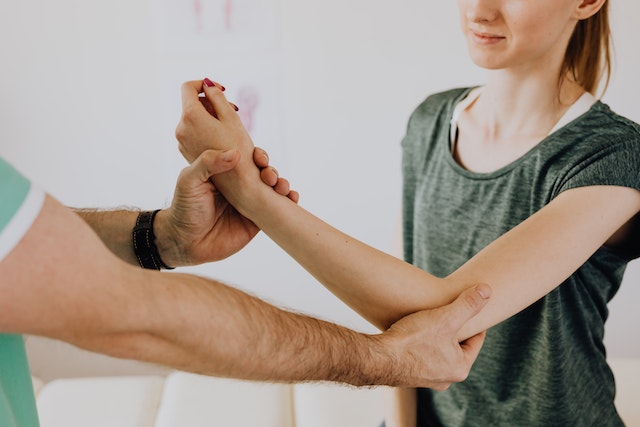
What makes our joints pop and click? Escaping gas, moving tendons and ligaments, or rubbing surfaces.
There are about 360 joints in the human body, although that depends on age. A joint is the connection between two bones that connects them and allows them to move. Without joints we would be unable to move. There are many types of joints, but we are going to look at the joints that are most likely to make popping noises. These would be joints like the knuckles, knees, shoulders, and elbows. These are the obvious joints, but there are a lot of other joints that we probably wouldn’t think of as joints. For example, the shoulder is not only one joint. It has the ball and socket joint that we know, but there is also a joint where it connects to the collarbone and the collar bone has another joint where it connects to the sternum. These joints allow the shoulder and collarbone to move slightly. Without them, the whole structure would be rigid and a lot more fragile. We also wouldn’t be able to lift our arms up.
The main joints we are talking about have two bones coming together. The ends of the bones are protected by a thin layer of cartilage, which is a rubbery and very slippery substance. It lets the bones move with very little friction. The bones are then joined to each other by ligaments and the muscles are attached to the bones with tendons. There are watertight sacs called bursa under all of the places where the muscles and the tendons rub on the bone. These sacs provide lubrication and stop the bones and the muscles from damaging each other. The whole joint is enclosed in a joint capsule that is made of a firm fibrous tissue. Inside the joint capsule is an airtight space with blood vessels and nerves. The nerves send signals to the brain to tell it what position the joint is in. The cells in the inner cavity produce synovial fluid which lubricates the joint, acts as a shock absorber, and provides nourishment to the cartilage in the joint.
So, why do our joints make noises? There are three reasons. The first reason is that the popping is caused by nitrogen bubbles escaping from the joints. Inside the inner joint cavity, the synovial fluid is a viscous fluid that is very similar to egg whites in consistency. It is a type of plasma and contains proteins that nourish the cartilage. It also contains oxygen, nitrogen, and carbon dioxide gases. Sometimes, when the joint is stretched quickly the nitrogen gas forms bubbles that rapidly grow until they reach their maximum size and burst. When they burst, they produce a shockwave, which is the popping sound we can hear. This process is called cavitation. People are often taught by their parents that popping their joints will give them arthritis, but there is no evidence for this.
The second type of joint nose can be down to the tendons and the ligaments. Sometimes, when you move a limb, the tendons and the ligaments might move out of place. After the movement is over, they can snap back into position, releasing a cracking sound. This is most common in the knee and the ankle. If you are exercising and one of your joints is making a cracking sound each time you move it, it is probably the sound of the tendon or the muscle rubbing against bone. This can happen when the muscles are tight and stretching can put a stop to it.
The third reason for joint sounds is old age. As people get older, they lose the cartilage that covers the ends of the bones in their joints. This loss can be caused by disease, but it is more commonly caused by wear and tear. Each one of your joints moves hundreds of times a day and even with the synovial fluid, the cartilage can still wear down. And once it has worn down it starts to get rougher and the sound the joint make is the two rough pieces of cartilage rubbing against each other. If it gets very bad, then you might get bone rubbing on bone. The friction produces the sound. If things get so bad that the joint can’t be used anymore, it is possible to have a joint replaced. It is possible to replace all of the major joints in the human body. And this is what I learned today.
Sources
https://www.ncbi.nlm.nih.gov/books/NBK279363/
https://en.wikipedia.org/wiki/Joint
https://www.pinnacle-ortho.com/why-are-my-joints-cracking-all-of-a-sudden

Pingback: How does a joint replacement work? - I Learned This Today